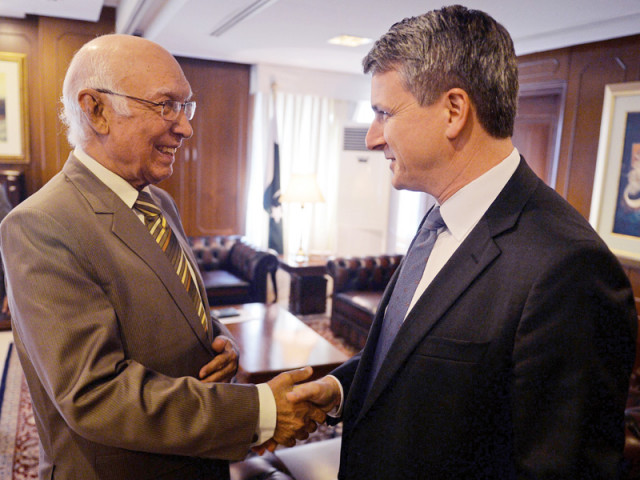Need for normalisation: India’s rise linked to Pakistan, says US envoy
Dan Feldman advises Islamabad, New Delhi to engage in dialogue.

US Special Representative for Afghanistan and Pakistan Ambassador Danial F Feldman believes India’s growing role in world affairs is tied to normalisation of its ties with Pakistan. “I’m convinced that India’s rise [in world affairs] cannot be realised without normalisation of Pakistan-India ties,” Feldman said during an interaction with Pakistani media persons at the US Embassy in Islamabad on Tuesday.
Engaged in this region’s affairs since 2009, Feldman served first as deputy and then as special deputy to Ambassadors Richard Holbrooke, Marc Grossman, and James Dobbins before assuming the role of special envoy on August 1 this year.
During his two-day tour to Pakistan, he will be meeting civilian and military leadership of Pakistan. He is scheduled to leave for Beijing on October 30 for a two-day visit to China.
He had meetings with Adviser to Prime Minister on National Security and Foreign Affairs Sartaj Aziz, army chief General Raheel Sharif and others before his interaction with the media later in the afternoon.
Feldman said the United States was concerned over increasing border tensions between the nuclear-armed South Asian neighbours. However, he said, his country’s policy vis-à-vis Kashmir remained the same: Pakistan and India should engage in dialogue to resolve their contentious issues.
According to Feldman, there is a ‘remarkable’ opportunity for regional stability after the new unity government has replaced the Hamid Karzai regime in Kabul. The new Afghan administration wants to start a new chapter in Pak-Afghan relations, he said, adding that he felt similar sentiments on Pakistani side during his interaction with Pakistani officials. “I hope that all stakeholders will avail this opportunity,” he said.

In reply to queries airing apprehension of a possible chaos in Afghanistan once the US completed troop pullout by end of the year, the US envoy made it clear that Washington was not going to leave Afghanistan and would only stop its combat operations.
“It is a misconception that we will not be there. We will be there in significant numbers. The combat operations will stop. International community’s assistance and commitment will continue for a long term in Afghanistan” he said.
He said the US would remain engaged in the region for a longer term because this was in its own security interest.
The visiting US envoy was not sure about the future of the Coalition Support Fund – the reimbursements of around $1 billion Pakistan has been getting for the past many years on account of its expenses in fighting war against militants mainly on its western border regions.
He was also unsure about any possible future extension of civilian assistance to Pakistan under the Kerry-Lugar-Berman bill which has expired this month. The two sides dispute over real disbursements under this programme under which Pakistan claims that it was to get $1.5 billion every year for five years but actually it received less than $5 billion so far.
“We will continue to have greater linkages on economic side and security side. I don’t see our commitment will diminish. Maybe it will be from assistance based to economic ties,” he said, while explaining the difficulties in getting approval of assistance programmes disbursements from US legislature.
No terrorists’ haven on either side
To a question about Pakistan and Afghanistan’s cross allegations of terrorist safe havens, he said there is a need for the two countries to engage more in dialogue at political, military and intelligence levels. He said the US believes there should not be any safe havens on either side. “There is a need for sustained dialogue,” he added.
Talks with Taliban
Feldman claimed that the US had no direct interaction with the Afghan Taliban since its last aborted attempt of reconciliation ended in March 2012. “We have had no meeting with the Taliban since March 2012,” he said, adding that if the US could assist in any reconciliation it will help new Afghan administration. “Otherwise, the unity government can adopt its own mechanism,” he added.
No support for unconstitutional move
On issue of Pakistan’s internal political situation and its likely impact on Pakistan-US ties, he said his country supports dialogue between all stakeholders. “However, it will oppose anything extra-constitutional in the country, which has a history of periodic military takeovers,” he added.
Meeting with General Raheel
According to the military’s media wing – Inter-Services Public Relations (ISPR) – which issued a short statement after ambassador Feldman’s meeting with army chief General Raheel Sharif, the overall regional security situation, particularly situation in Afghanistan, came under discussion.
Ambassador Feldman said Washington was looking forward to General Raheel’s maiden visit to the US as army chief early next month.
Published in The Express Tribune, October 29th, 2014.



















COMMENTS
Comments are moderated and generally will be posted if they are on-topic and not abusive.
For more information, please see our Comments FAQ